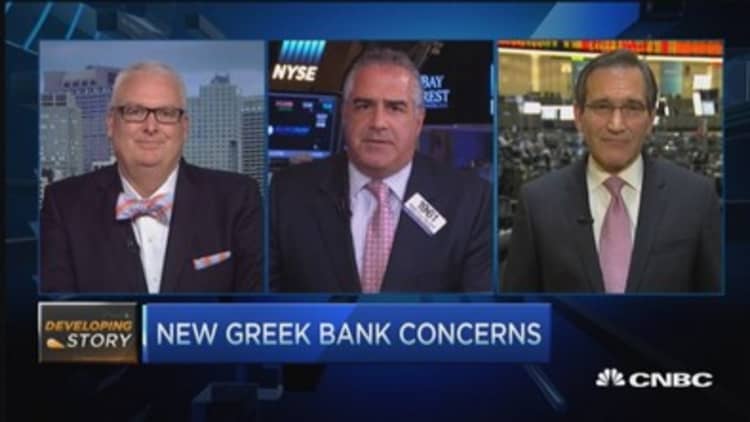
Wall Street's buoyant tone in the face of a potential Greek debt cataclysm could be an indication that a comprehensive deal is on the way, a trader said on Thursday.
Reports that Greek banks may not be able to open Monday after Greece failed to reach a deal with creditors did little to dampen the stock market rally. U.S. stocks closed about 1 percent higher, with the Nasdaq ending above its closing high set in late May and its all-time record high set in intraday trade in March 2000.
At least one market watcher thinks that may be a hint of better news on the horizon.
"Ultimately, what I think the market is telling you is in the 11th hour, over the weekend, that the threat of a Greek bank closing on Monday is going to put real pressure on [Greek Prime Minister Alexis] Tsipras and his government to finally come to the table and sign this deal," Kenny Polcari, director at O'Neil Securities, said in an interview with CNBC's "Closing Bell" Thursday.
'Nobody should be surprised'
Greece failed to reach a deal with its creditors on Thursday, and a new summit is set for Monday. The cash-strapped Hellenic Republic is struggling to avert default on its mountain of debt, which some warn could ricochet across the global economy.
Read MoreECB warns Greek banks might not open Monday
Two officials told Reuters that during a meeting between the European Central Bank and euro zone finance ministers, ECB board member Benoit Coeure was asked if Greek banks would be able to open Friday. According to Reuters' sources, Couere answered: "Tomorrow, yes. Monday, I don't know." However, the ECB later denied the Reuters report.
Polcari said that even if the Greek banks failed to open Monday, it should not come as a shock the market.
"Everyone had to understand, you saw this coming," he said. "We've seen this conversation unfold so nobody should be surprised."
Jim Lowell, chief investment officer at Adviser Investments, said the reality is that U.S. investors generally only have less than 2/10 of a percent of their assets in Greek stocks or bonds.
Therefore, "I think they are taking some measure of confidence that the U.S. economy is on the slow growth, not no growth, track," he told "Closing Bell."
Read More
With the exception of Greece, the euro zone is beginning to recover, Lowell added. "If Greece does in fact exit, which is anybody's guess, that too I think would be a fundamental positive, an actual catalyst for more gains in the euro zone marketplaces."
—Reuters, CNBC's Michelle Caruso-Cabrera and CNBC's Evelyn Cheng contributed to this report.


